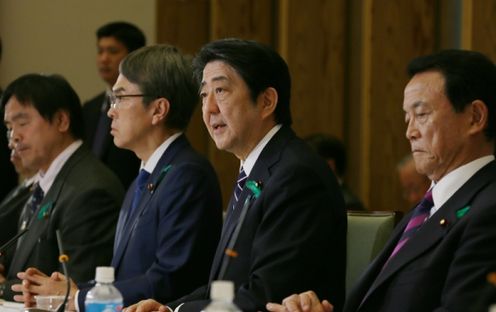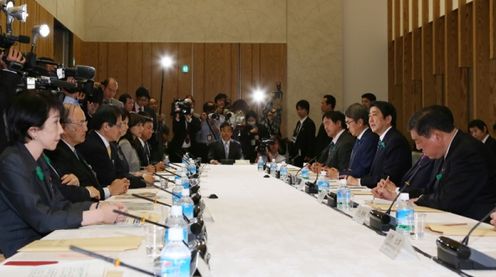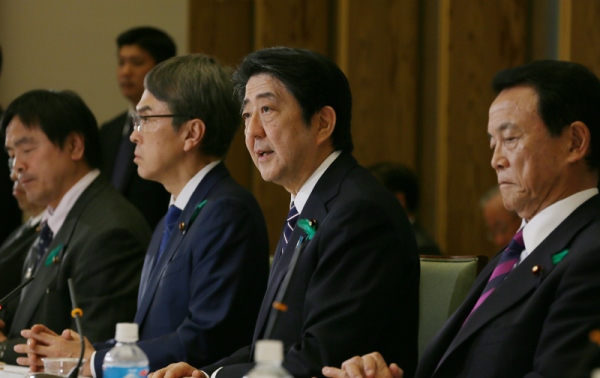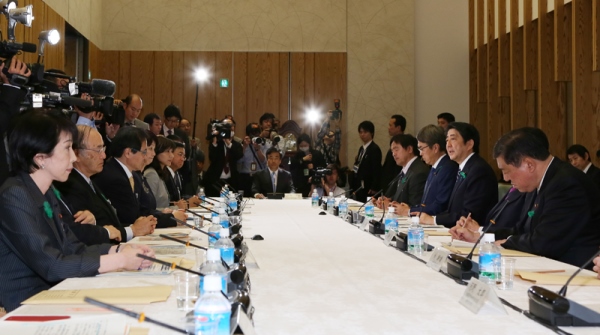Home > News > The Prime Minister in Action > April 2016 > Industrial Competitiveness Council
The Prime Minister in Action
Industrial Competitiveness Council
April 19, 2016

Photograph of the Prime Minister making a statement (1)

Photograph of the Prime Minister making a statement (2)
[Provisional Translation]
Prime Minister Shinzo Abe held the 26th meeting of the Industrial Competitiveness Council at the Prime Minister’s Office.
At the meeting, there was a discussion on the Growth Strategy toward realizing a nominal GDP of 600 trillion yen, and on the creation of innovation and of human resources with a mindset marked by a spirit of welcoming challenges.
Based on the discussion in the meeting, the Prime Minister said,
“We have made major improvements in the so-called ‘six obstacles to doing business in Japan,’ which had been fetters to the international competitiveness of Japanese companies, through reforms of vested interests such as the complete liberalization of the electricity retail market, and progress in dropping the effective corporate tax rate, as two examples. However, the private-sector moves are lacking in strength. The challenges of the Growth Strategy in the second stage are to cultivate promising growth markets, to implement productivity reforms, and to strengthen human resources.
Today, toward realizing a GDP of 600 trillion yen, I proposed the Public-Private Strategy Project 10 in which the public and private sectors will work together to cultivate new promising growth markets.
The young generation of Japan is used to and familiar with IT and robots. The huge wave of the fourth industrial revolution will provide youth with the opportunity to change society and to be dynamically engaged on the world stage.
Will we be able to create businesses that solve social issues by boldly transforming previously existing frameworks, and prevail in international competition? Or will we experience a steady decline as a subcontractor to overseas platforms, stuck on the same growth line as in the past? Now is the turning point that will determine the future of our young people.
We will accelerate reforms and introduce new frameworks. And we will implement the roadmap formula, whereby we first determine when we want a particular technology to be implemented in society, and then calculate backwards from there to design each step in the specific systemic reforms required.
With the viewpoint of a business operator, we will fundamentally reduce administrative costs. To that end, we will also advance the simplification and greater use of IT in regulatory reforms and administrative procedures in a unified manner.
I would like the young people of Japan to come through this era of the fourth industrial revolution, and to become leaders. To that end, we will make programming education compulsory from primary and middle school. Furthermore, we will make thorough use of IT to support study that suits each student’s learning level.
I would like us to invite outstanding personnel from overseas who will play core roles in the fourth industrial revolution. To do so, we will make the length of time required to obtain permanent residence in Japan the shortest in the world. We will introduce a ‘Japan-version green card for highly skilled foreign personnel.’
Our new Growth Strategy must be something that opens up limitless possibilities to the young people of Japan. Based on today’s discussions, I would like you to formulate ideas with an innovative mindset.”


